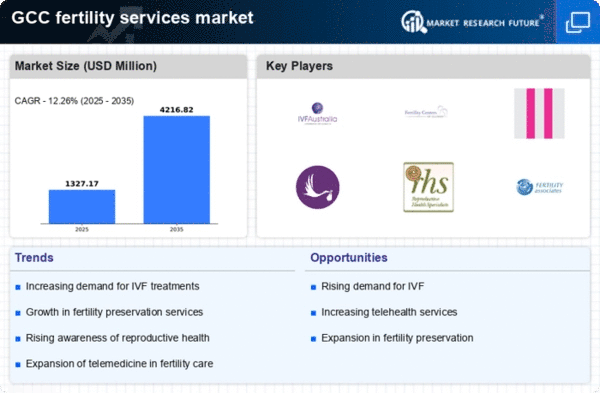Rising Infertility Rates
The fertility services market is experiencing growth due to rising infertility rates across the GCC region. Factors such as delayed marriages, lifestyle changes, and increased stress levels contribute to this trend. According to recent data, infertility affects approximately 15-20% of couples in the GCC, prompting a greater demand for assisted reproductive technologies. This increase in infertility cases drives the need for advanced fertility services, including in vitro fertilization (IVF) and other reproductive health solutions. As awareness of these services grows, more couples are seeking assistance, thereby expanding the market. The fertility services market is likely to see continued growth as more individuals and couples recognize the importance of addressing infertility issues promptly.
Advancements in Reproductive Technology
Technological innovations play a crucial role in shaping the fertility services market. The introduction of advanced reproductive technologies, such as preimplantation genetic testing (PGT) and cryopreservation techniques, enhances the success rates of fertility treatments. These advancements not only improve the chances of conception but also provide couples with more options tailored to their specific needs. The fertility services market is witnessing a surge in demand for these cutting-edge technologies, as they offer solutions that were previously unavailable. As clinics adopt these innovations, they are likely to attract more patients, further driving market growth. The integration of artificial intelligence in treatment planning also appears to be a promising trend, potentially revolutionizing patient care in the fertility services market.
Cultural Shifts Towards Family Planning
Cultural attitudes towards family planning are evolving in the GCC, influencing the fertility services market. As societal norms shift, there is a growing acceptance of assisted reproductive technologies among younger generations. This change is reflected in the increasing number of couples opting for fertility treatments, as they seek to balance career aspirations with family planning. The fertility services market is benefiting from this cultural shift, as more individuals are willing to explore options such as IVF and egg freezing. Additionally, educational campaigns aimed at destigmatizing infertility are likely to further encourage couples to seek help. This trend suggests a promising future for the fertility services market, as it aligns with changing societal values and priorities.
Growing Awareness of Reproductive Health
Awareness of reproductive health issues is on the rise in the GCC, positively influencing the fertility services market. Educational initiatives and public health campaigns are increasingly informing individuals about fertility challenges and available treatments. This heightened awareness encourages couples to seek assistance sooner, thereby increasing the demand for fertility services. The fertility services market is likely to see a surge in inquiries and consultations as more people recognize the importance of reproductive health. Additionally, the integration of fertility education into school curricula may further enhance understanding and acceptance of fertility treatments among younger generations. This trend indicates a promising outlook for the fertility services market, as informed individuals are more likely to pursue available options.
Increased Investment in Healthcare Infrastructure
Investment in healthcare infrastructure across the GCC is significantly impacting the fertility services market. Governments and private entities are allocating substantial resources to enhance healthcare facilities, including specialized fertility clinics. This investment is crucial for improving access to quality fertility services, which is essential for addressing the rising demand. The fertility services market is likely to benefit from these developments, as improved infrastructure can lead to better patient outcomes and higher success rates. Furthermore, the establishment of partnerships between local and international healthcare providers may introduce advanced practices and technologies to the region. As a result, the fertility services market is poised for growth, driven by enhanced accessibility and quality of care.
















